If you’re a lover of animals, starting a business in the pet industry may be a great career choice for you. After all, there are several different types of pet business opportunities available. You may be familiar with the basics, like pet sitting, training, and walking — but there are several pet business opportunities you may have never thought of.
With the growing opportunity in the pet industry, creating a pet business could be an extremely lucrative and rewarding career. In fact, 67% of U.S. households own at least one pet. And in 2019, Americans spent $95.7 billion just on their pets.1
We analyzed and outlined data on the most popular pet businesses to help you figure out which pet-related career or side hustles to consider, and ways to protect your business along the way. Read on or skip to our infographic to discover the best pet business ideas for your lifestyle.
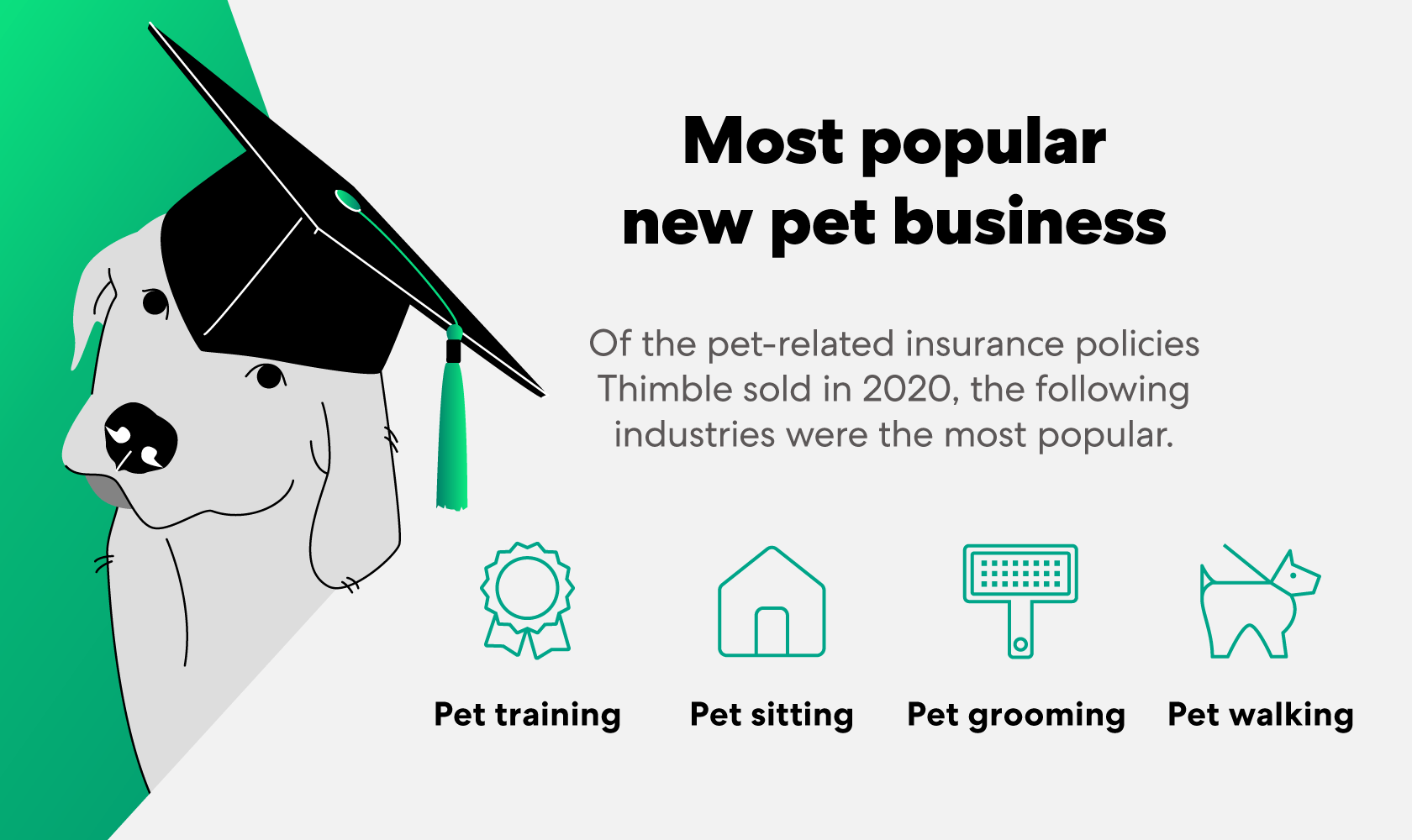
Pet obedience
If you swear by daily routines, exercise, and are a natural with animals, pet obedience might just be the pawfect business venture for you. Obedience involves pet training and behavior services to ensure a pet’s success within homes and among its surroundings.
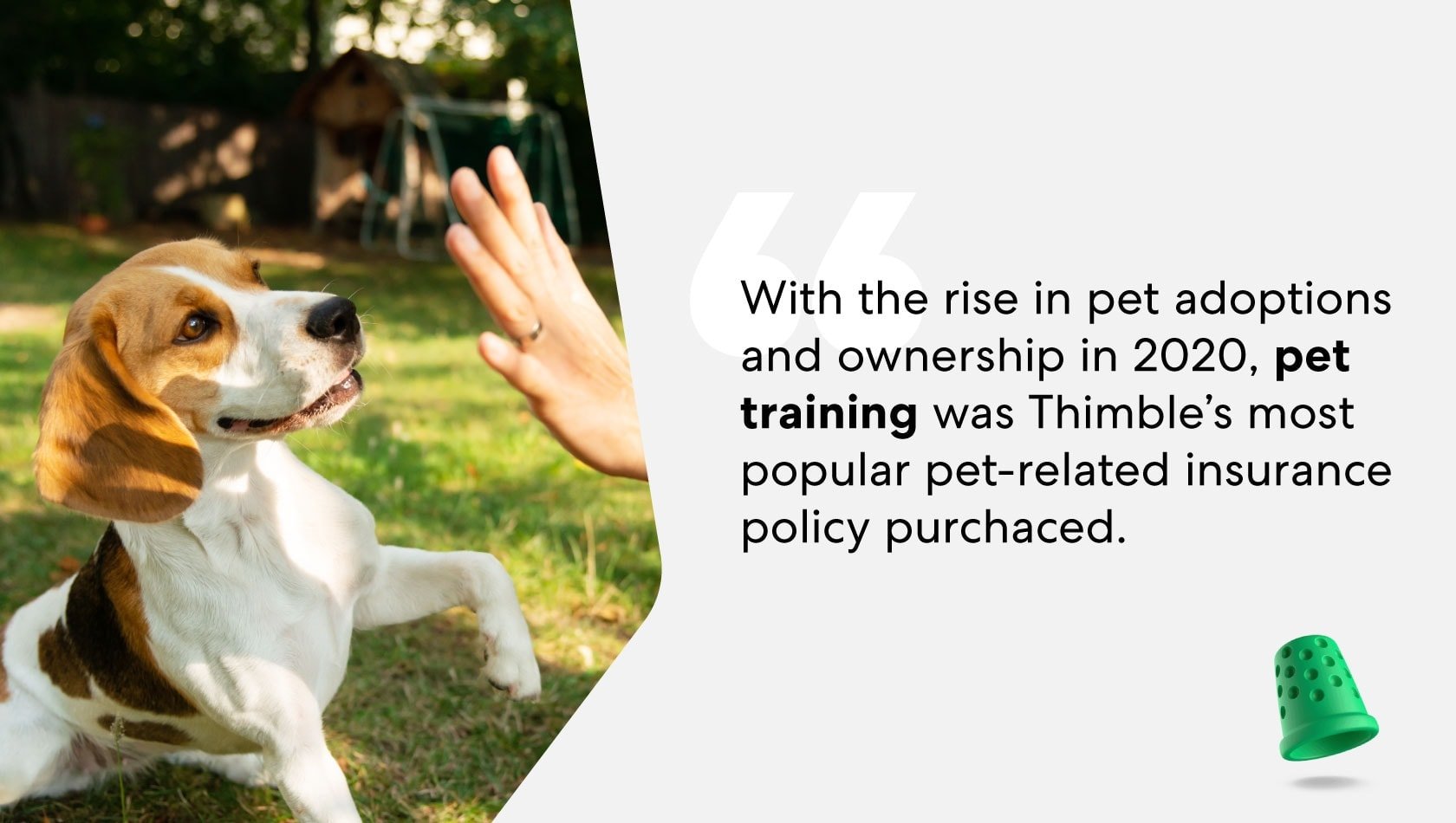
1. Dog training
With the rise in pet adoptions and ownership in 2020, pet training was one of Thimble’s most popular pet-related insurance policies purchased in 2020 — and for good reason. Pet training helps both pets and owners develop and maintain good habits to improve their relationship and interactions with others.
The startup costs of becoming a dog trainer are relatively low, as you can train dogs in just about anywhere (a park, a home, etc). However, you may want to consider getting certified as a dog trainer first, just so you understand best practices for teaching dogs with different behaviors and communication styles.
The Certification Council for Professional Dog Trainers offers one of the most reputable programs for dog training professionals. They offer two different certifications (CPDT-KA and CPDT-KSA) that can help you master dog training and can give you a competitive advantage when it comes to your businesses.
2. Service or therapy dog trainer
Those who train service or therapy dogs have a highly rewarding profession that develops a dog’s skills and behaviors for therapy work. When training a service/therapy dog, your duty is to socialize the animal to new people, objects, and environments, to ensure that they provide their owner with the required support needed to help perform daily tasks.
Therapy dogs are often used in hospitals, nursing homes, schools, or wherever they can be the most physically and emotionally helpful. There are no qualifications or certifications needed to train a service or therapy dog. That said, it’s no easy task. In addition to understanding how to adequately train the dog, you need a deep understanding of human disabilities and how to create a working relationship between pets and the owner in need.
3. Behavioral specialist
A pet behaviorist will study the way an animal behaves to try to determine the cause of certain types of behaviors, fears, or aggressions. A behavioral specialist is often a great option for owners who are having trouble connecting to or understanding their pet.
If you’re interested in becoming a pet behavioral specialist there are two professional organizations that can help you level up your skills and become certified: The Certification Council for Professional Dog Trainers (CCPDT) and the International Association of Animal Behavior Consultants (IAABC). Both organizations require behavioral consultants or specialists to recertify every three years to ensure they’re up-to-date with the latest research and best practices.
4. Dog walker
If your idea of a good time involves long walks or exercise, becoming a dog walker might be a good idea. Most dogs need anywhere from 30 minutes to two hours of exercise each day, so becoming a dog walker can help both dogs and yourself stay healthy.
What’s more, the average income of a dog walker is $29,921 per year.2 Getting paid to exercise? Sign me up! Apps like Rover and Wag! make it extremely easy to get paired with potential clients, based on your availability, skillset, and experience level.
5. Dog whisperer
Dog whisperers are people who can “talk” to dogs or understand what a dog is trying to communicate through its body language. Dog whispering is centered around understanding the psychology of a dog, pack dynamics, energy, and body language. The job of a dog whisper typically requires them to find positive outlets for dogs to express themselves to their owners in order to help improve their relationship.
Although a dog whisperer takes on a more unconventional approach when it comes to dog obedience, they still make a good income, averaging just over $51,000 a year. Who knows, if you’re really skilled, you could become the next Cesar Millan — who is a well known dog whisperer and has an estimated net worth of over $45,000,000!
Pet health and care
Pet health and care refers to any service designed to improve a pet’s health, quality of life, or safekeeping. Humans tend to see their pets as an extension of their family, and consider their health and care a top priority, making it an extremely important type of pet service.
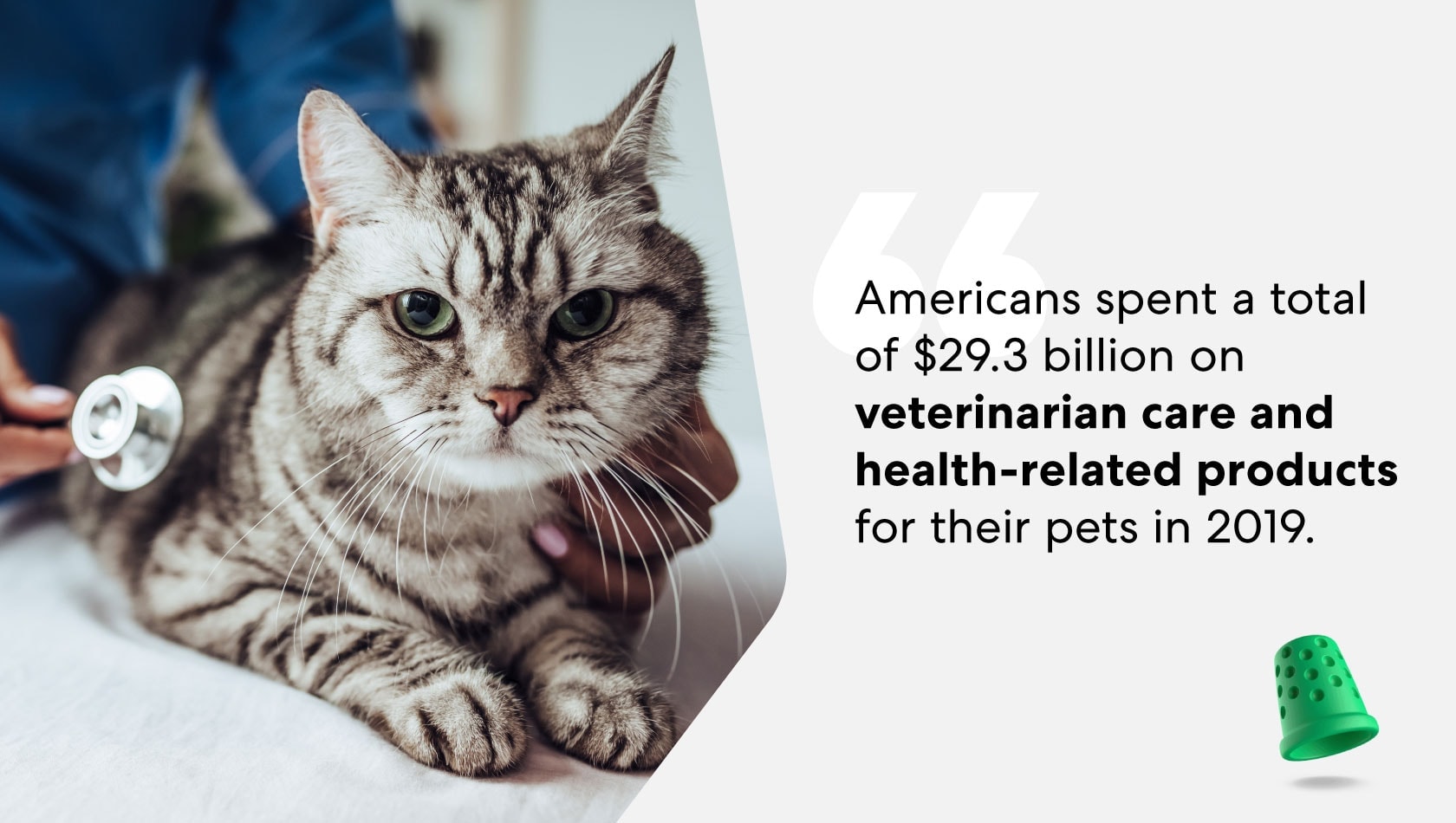
6. Veterinarian
Becoming a veterinarian may be one of the first things that comes to mind when you think of a pet-related career. A veterinarian is a medical professional tasked with diagnosing and treating animals.
Aspiring vets can expect to commit to eight years of veterinary school and spend an average of $200,000 for in-state tuition and $275,000 for out-of-state tuition. However, the time and financial investment could pay off, with the median annual salary of a veterinarian being around $95,000. 3
7. Pet manicurist
Have you ever tried to trim your pet’s nails? Let’s just say it’s not for the faint of heart. For pet owners who don’t want to go through the hassle of trimming their dogs’ or cats’ nails, they might hire a pet manicurist. That said, a pet manicurist must be able to adequately respond to different types of animal behavior, which could include anxiety or aggression.
There are no specific education requirements to become a pet manicurist, but most job sites will ask for prior pet handling experience. Educating yourself with the best trimming techniques and investing in proper tools could be useful. Once you get started, you can expect to make anywhere from $16-$20 per hour (+ tips). Pet manicurists can offer their services at pet spas, daycares, or even make house calls.
8. Dog groomer
Grooming is another one of those chores of dog ownership that many would rather pay a professional to do, as it requires mastered techniques.
Dog grooming is important to keep a dog’s coat healthy and also to help them stay cool in hot climates. Dog groomers can expect to work from their own grooming salon, travel to people’s homes, or both with a mobile grooming business, that’s both convenient and cost-effective. There are few requirements needed to become a dog groomer, however a high school education is standard. Completing a dog grooming apprenticeship or taking a dog grooming course can help you learn the tricks of the trade and market your services more effectively.4
9. Pet shelter operator
A pet shelter is where stray, lost, or abandoned pets stay until they find a suitable home. Providing a safe haven for pets that have been neglected, traumatized, or victimized can be a rewarding experience for those passionate about finding good homes for pets.
There’s a lot that can go into owning a pet shelter like what type of animals you want to rescue, licensing and zoning requirements in your state, and veterinary/healthcare assistance. The good news is that many pet shelters welcome volunteers. So, offering your time for free could be a good way to learn the ins and outs of the business before starting your own.
10. Pet allergist or dermatologist
Allergies affect 10-20% of the dog and cat populations, so a pet allergist, or someone who specializes in allergies, symptoms, and treatment is pretty important.5 These specialists can also diagnose and help treat skin problems or ear infections — a common ailment among pets.
To become a pet/veterinary dermatologist, you will need to finish a Doctor of Veterinary Medicine degree, pass Veterinary licensing exams, and complete 2-3 years of residency training.
11. Pet physical therapist
As a pet physical therapist, you would provide rehabilitation and care to animals who have gone through an injury, surgery, or suffer from chronic pain. This service can help speed up an animal’s recovery time and improve their quality of life.
As of March 2021, the average annual pay for an Animal Physical Therapist in the United States is $79,011 a year.6 So, not only can this be a rewarding business, but a profitable one as well.
12. Pet massage therapist
Massages aren’t just great for humans, they have been shown to benefit cats, dogs and other animals. As owners look for ways to improve their pets’ lives and increase longevity, they may look to a massage therapist for their services. Pet massage therapists can work on relaxing your pet’s muscles, increasing circulation, and enhancing their range of motion.
To become a pet massage therapist, an animal-related degree may be useful, but it’s not necessary. After going through some training, you can become a pet massage therapist. Some state laws may also require certifications.
13. Pet travel service
Traveling with pets can be stressful. If you have a reliable method of pet transportation, or even just some tips to share with pet owners, you can offer your services as a pet travel specialist, that helps pet owners safely transport their pets from one place to the next.
To get started, you’ll have to register your business and services with The International Pet and Animal Transportation Association (IPATA), when they can classify you as an ‘Intermediate Handler’ for pet travel. The IPATA also offers a mentorship program, available to help new pet transportation business owners understand best practices with pet transportation.
14. Pet hotel/luxury boarding service
When pet owners go out of town or on vacation, they often need to find a sitter or boarder for their pets. They may also look to have their pet stay at a pet hotel or luxury boarding service to meet their specific needs.
A pet boarding business needs to be properly designed to be a comfortable home away from home. This includes having appropriate kennels for different pets and pet breads, and adequate outdoors space for dogs to exercise. You will also need to hire skilled staff to care for multiple pets’ needs throughout the day and night. That’s not all, according to Gingr, more and more pet owners are becoming tech-savvy, so embracing technology with pet cams or digital performance/behavior updates could also be a worthy investment.
15. At-home boarding service
Many pets can suffer from separation anxiety or nervousness when away from their owner, so leaving your pet in a real home with a loving family may help eliminate some of their stress. If you’re a lover of pets and don’t mind sharing your home with a few fur babies, hosting an at-home boarding service could be a great business opportunity.
What’s more, starting your own pet boarding business is relatively inexpensive, while earnings could average $37 per day and $50-$75 per night. You’ll just need to make sure you’re insured, have space for your pet guests, and the necessary pet supplies to ensure adequate care and protection.
16. Doggie daycare professional
Aside from just needing someone to watch their animals while they’re traveling, some pet owners just want somewhere for their pets to go and socialize with other pets on a more regular basis. You can open a doggie daycare to serve that need and allow for pets to get exercised and trained throughout the day.
The startup costs of a doggie daycare could add up. Aside from permits, licensing, and insurance, you’ll need the perfect location, fencing and barriers, pet supplies, employees, and lots of cleaning supplies. New daycare business owners can expect to spend anywhere from $2,000 up to $50,000 to get started, depending on the size and location of their business.
Pet food supply
If you’re a foodie, or concerned about the quality of food that pets eat, consider a career in the pet food supply industry. From developing kibble recipes to making and selling it in a trendy pet store, there are several business options that are bound to be successful.
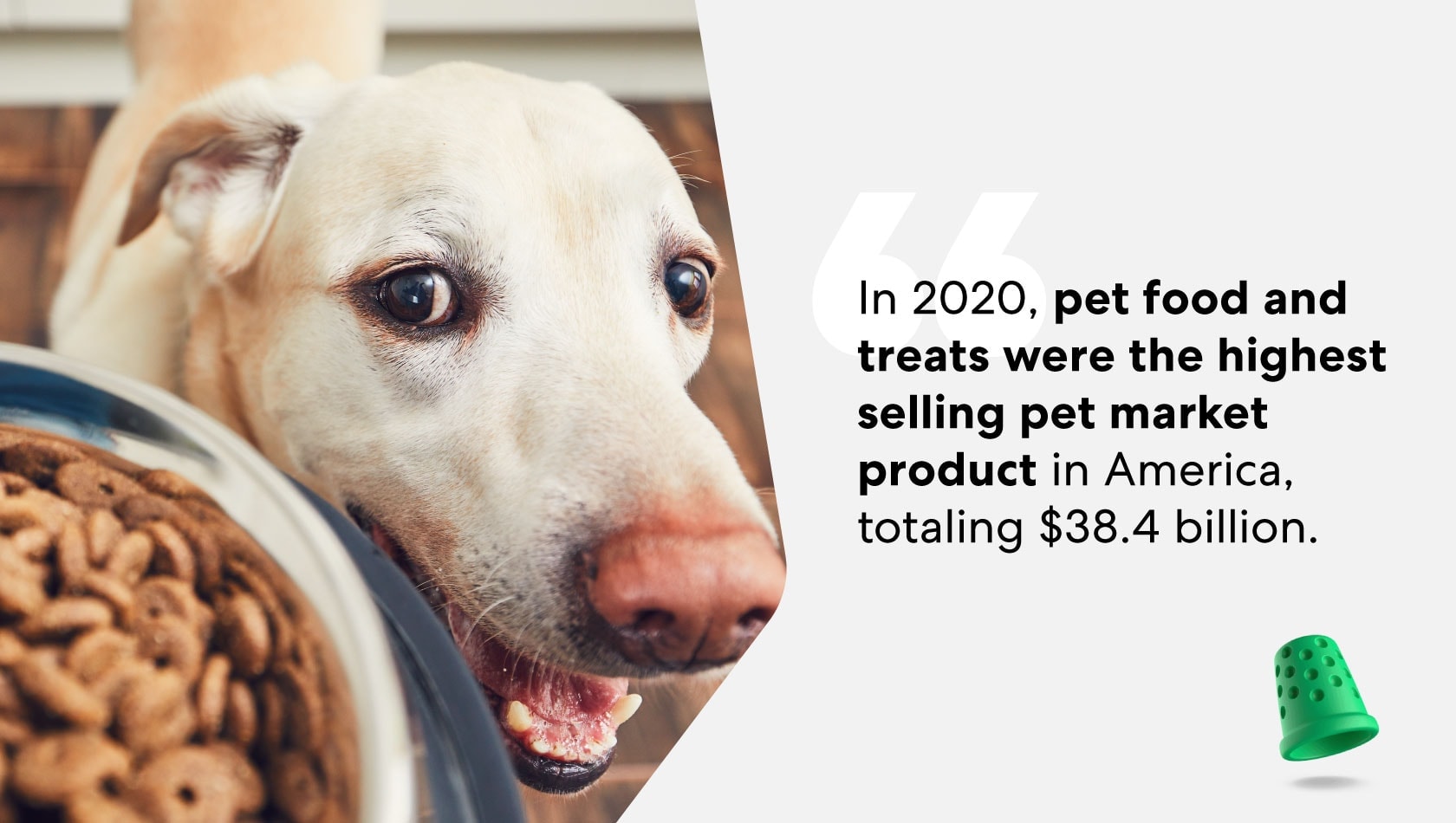
17. Pet bakery owner
Dogs and cats love treats as much as any human. If you have a skill for baking, consider starting a pet bakery and selling delicious and nutritious treats for pets. In 2020, pet owners in the United States spent $38.4 billion on pet food and treats, which could make this an extremely profitable market to enter.7
When it comes to a pet bakery, there are several options for setting up shop. You could have your own storefront, create a pet food bakery truck, or sell your baked goods online. You could even team up with a pet event planner and offer catering services for the next pup birthday party.
18. Pet nutritionist
A pet nutritionist specializes in animal nutrition and their specific dietary needs. An animal nutritionist may also be concerned with food development and processing. After getting a bachelor’s degree in food sciences or agricultural sciences, you can offer your services to help pets meet their nutritional needs and provide recommendations on diet adjustments.
The average income of a pet nutritionist in the United States is $75 target=”_blank”, 023, with a promising projected job growth of 7%.8 Pet nutritionists can work alongside veterinarians, develop new formulas for pet food, or even travel to various pet supply stores to educate customers on the latest food products.
19. Pet food subscription service
Another way to sell pet treats (or even meals) is by starting a subscription service. Online pet food orders and delivery has become increasingly more popular as shutdowns have pushed consumers to shop online. With Amazon leading the charge, they achieved 39% of the total online pet food and supply share in 2020.
For the pet food and care industry, it’s expected that ecommerce will grab 27% of the U.S. market by the end of 2021, and reach a 35% share by 2024. With a growing consumer need and a quality product, you may just have the perfect recipe for a pet food subscription business!
20. Dog restaurant
How about a restaurant for dogs? You could create a great dining experience for both pets and their owners. Creating specialized dog menus and an area for dogs to socialize is a great business idea for our four-legged friends. This new trend of ‘barkuterie’ boards could be the perfect addition to your pet menu!
Pet stores and retail
If you love spoiling your pet, owning a pet store or being a part of the pet retail industry could be a great career choice for you. Many pet owners see their pets like children and won’t hesitate to show their love with new toys, clothes, or their favorite treats.
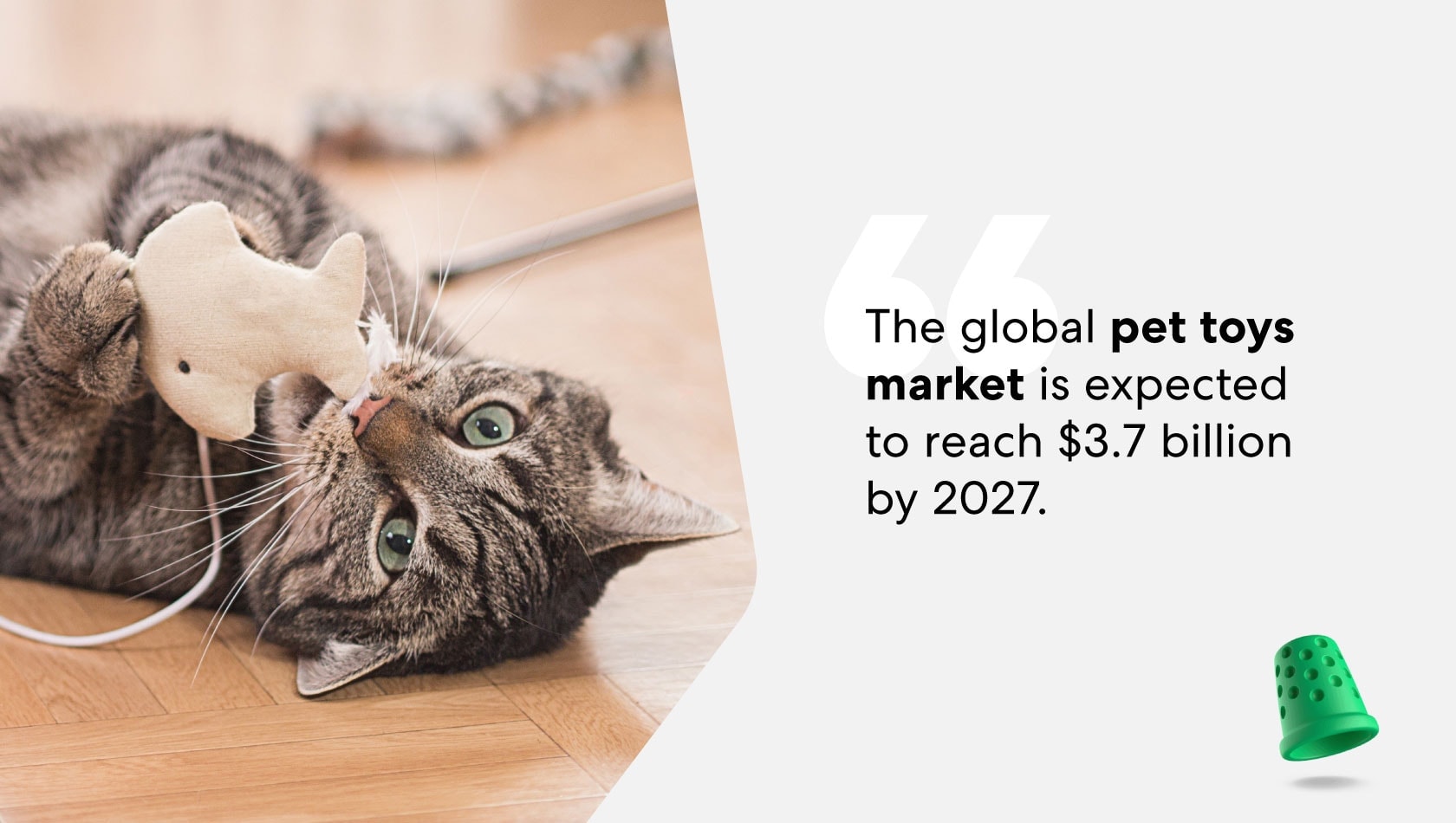
21. Pet supply store
A pet supply owner operates and owns a store that provides all kinds of pet supplies. You could have a storefront, or sell products online. This could be a costly venture to get started, but once you stock up on good products and have a solid marketing strategy in place, you’re sure to make a healthy profit.
While you don’t need any formal training to open a pet supply store business, you’ll still need to form a legal entity like an LLC, register as a corporation for taxes, open a business bank account, and obtain a Certificate of Occupancy if you’re operating out of a physical location.
22. Pet toy maker
Most pet owners purchase some kind of toys for their animals to play with. If you like sewing or designing small items, you could sell them as dog or cat toys. According to Future Market Insights’ analysis, pet toy sales are expected to grow annually by 7.2% between 2021 and 2031.
23. Collar and leash maker
As a collar and leash maker, you’d be tasked with creating both comfortable and fashionable accessories for pets. In addition to style, safety is a high priority for pet owners. Shoppers are increasingly looking for manufacturers to produce products that will allow pets to safely travel in the car, or have reflective properties for nighttime safety as well.
24. Pet clothing or bandana designer
If you have an eye for pet fashion, maybe it’s time to take your skills to the next level. Designing pet clothes can be a fun and creative way to express yourself and help pets do so as well. From everyday attire to halloween costumes, there’s a big market for pet clothing.
If you have a knack for design and crafting, creating dog bandanas could be a great side hustle or full-time business. You could sell your bandanas to pet stores, at craft stores, or even on online platforms like Etsy or Amazon Homemade.
25. Furniture designer
Some pet owners even like to purchase large beds, playhouses or other furniture for their animals to use. If you have skills as a woodworker or a builder, you could create some of these larger furniture items and sell them directly to pet owners or stores.
Many furniture designers will complete an undergraduate degree in industrial or commercial design to learn the necessary skills needed to design furniture, like sketching, designing, and methods in manufacturing.
Creative pet business ideas
If you’re one of those pet lovers who loves taking photos, or posting updates on your social media, consider a more creative route when starting a pet business.
26. Pet momager
What’s a pet ‘momager’ you ask? Like the name suggests, it’s a pet mom who doubles as their manager. Momagers across the world are running social media accounts dedicated to their pets that have become quite famous. Many of these accounts are created from the point of view of the pet.
Step 1 to making your dog famous: think about what makes them unique. From there, you can create consistent content to engage followers. Using hashtags and enticing your audience with themed giveaways is another great way to gain followers. With enough followers, you can start monetizing your account through sponsored content, ads, and more.

27. Animal blogger
If you have a talent for writing or content creation, the pet business for you may be blogging. As a blogger, you could share photos, training tips, or even delicious homemade recipes for your readers.
If you gain enough of an online audience, you could start getting paid for sharing advertisements, new pet products, or other sponsored content.
28. Pet photographer
For pet lovers with artistic talent, you can offer your services as a pet photographer, where customers will come to you to capture the perfect snapshot of their pet. However, to start a successful business as a pet photographer, you’ll need a few things like skill and technique, proper equipment, a website, and different service options or photo packages.
Don’t worry if a photography studio is out of your budget right now, you can offer your services by traveling to pet shows or competitions, daycares, or adoption events.
29. Pet Event Planner
Here’s a fun one. If you have an affinity for party planning or hosting, maybe it’s time to consider being a pet event planner. As a pet party planner, you’ll be tasked with creating the perfect pet soiree or social. You can plan pet birthday parties complete with pup-cakes and pawty favors (see what we did there?), or even plan shelter fundraisers and adoption events.
You don’t need a degree to become a pet event planner, but required skills include project management, effective planning, and organizational skills.
30. Animal Talent Agency
Have an eye for star pet-tential? By creating an animal talent agency, you can discover pet talent and connect them with tv, movie, or modeling roles. There is no professional license required for agents and talent managers, however, a business license may be required, depending on your state.
Aside from knowledge of the industry, to be successful in this business you’ll need access to a great network of directors, photographers, and other talent-seekers. You’ll also need a thorough understanding of booking commitments and contracts.
Once you have your business idea down, make sure to get insured. After all, while working with animals can be fun and rewarding, it can also be unpredictable. General liability insurance with Thimble’s added Pet Protection can protect your business if an animal is injured—or causes injury or damage—while in your care.
Some of the most fulfilling careers start with a passion. If you have a love for animals, consider turning it into a long-lasting business. With the industry continuing to grow, there’s no better time to get started.

Sources:
- APPA. Americans’ Pet Spending Reaches Record-Breaking High: $95.7 Billion.
- Zip Recruiter. Dog Walker Salary.
- U.S. News. How Much Does a Veterinarian Make?
- Study.com. How to Become a Dog Groomer: Requirements, Job Description & Salary.
- National Center for Biotechnology Information, U.S. National Library of Medicine. Dog and Cat Allergies: Current State of Diagnostic Approaches and Challenges.
- Zip Recruiter. Animal Physical Therapist Salary.
- Statista. U.S. pet market sales by category 2011-2020.
- Pet Food Industry.Capstone Headwaters releases latest pet and animal care update.








